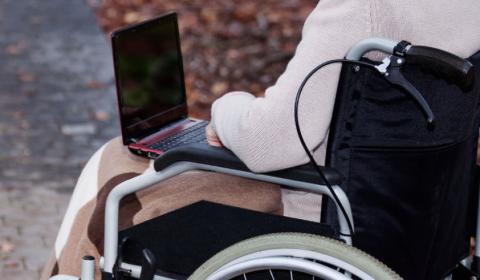“Will I end up in a wheelchair?” I asked the doc as he diagnosed me with a debilitating illness. Memories of Annette Funicello’s downslide into MS disability populated my brain, and the worst thing I connected to multiple sclerosis (MS), my new diagnosis, was a diminished life in a wheelchair.
Years went by, and true to form, a wheelchair became a vital part of my existence. Before it was my life, I wondered why people were talking about their living room chairs. I quickly learned that the shorthand term “chair” referred to their wheelchair! An unknown world suddenly came to be my new normal. Disability issues weren’t on my radar until they included me.
MS blew the roof off my tidy, little life, and gave me new eyes with which to see how simple etiquette can make an immense difference.
Wheelchair life for me is a study in human behavior. I’ve concluded there are roughly three kinds of people: helpful, oblivious, and rude. These compassionate helpful humans are the ones who open doors, hold elevator doors open for that last second before they shut on my extended arm, or those who retrieve articles at my request on unreachable high shelves (for example, grocery shopping with ceiling-height shelving). They get my pleas for help.
Public restrooms are one of the best places to study people’s behavior! Consider where paper towel dispensers are located in public bathrooms. They are positioned unthinkably higher than the counters and are impossible to reach in a wheelchair, never mind the faucets that are set back along the wall instead of within reaching distance for a person sitting in a chair with maybe 12” of reach. Occasionally there is that helpful person who kindly hands me paper towels from the dispenser, knowing that it is unreachable to me. People’s random kindnesses show courtesy, good rearing, and compassion.
Then there are those able-bodied patrons who obliviously occupy the handicap toilet stall. I sometimes comment to them as they leave, “Please use the able-bodied stall next time,” to which I may get a less-than-authentic “oh, sorry” flip comment. Until or unless someone is familiar with, or has a direct connection to, the world of disability, no one knows the integral need for grab-bars to steady oneself, a higher toilet seat for balance & maneuverability, the large space to provide turn-around room for a chair or scooter, or the larger size door to fit a wheelchair. The oblivious able-bodied need not enter.
“Your mother raised you correctly!” is a comment I happily voice to young people who, of their own volition, open doors and show courtesy for those who are different than they. I want to think I did the same thing at their age. But I’m not so sure I was aware of the simple gestures that are now so obvious and appreciated by me. How one’s perspective changes when circumstances become drastically altered!
We all know drivers who wrongly park in handicap parking spaces and rudely feel entitled because the regular spaces are full. This is rude behavior at its worst. Disabled people generally require the shortest walk distance possible, and whoever cuts off that ADA privilege deserves to be punished.
It is nearly impossible from a wheelchair position to open a door without automatic door openers (aka “the paddle”). Take, for example, the front door of a doctor’s office that I visit. This outside door, easily 75 lbs., not only protects the building, as a heavy and solid sentinel, but it is impossible to open from a wheelchair without an automatic or electronic aid. The alternative is to wait for a kind and unsuspecting soul to open the door when he/she comes into view. Reading material and snacks in my bag become go-to activities to wait out the minutes or longer. Patience is a most important quality to integrate when dealing with the public!
I say ‘my chair is my body’ to strangers who obliviously hang onto my power wheelchair on city buses, or bang their microwave-size backpacks into my chair’s delicate electronic computerized arm with the power of a linebacker. My goal is not only to avoid system problems with the equipment, but also to avoid having the duct-taped chair look like it belongs with a seated occupant panhandling for money on the corner.
Almost overnight my able-bodied friends become proponents of wheelchair courtesy by hanging around me. They notice how helpful it is to roll through open doors rather than crashing into walls while pushing a heavy door with one hand with the other on the joystick as the chair moves crookedly and uncontrollably forward. Awareness is needed to be mindful of the simple things able-bodied people take for granted that a wheelchair person can no longer do for themselves. Examples are: removing a chair to make room for a wheelchair at a table, help with putting on clothing items when arm / leg movement is restricted because of confinement in a chair, moving obstacles out of the path of a wheelchair, etc. SIMPLE ACTS OF KINDNESS ARE GREATLY APPRECIATED BY THOSE OF US IN WHEELCHAIRS, not to mention the general public. Despite my original fears, I came to realize that what I thought I couldn’t live with is precisely what I came to appreciate. I feared becoming dependent on a wheelchair, but it didn’t take long to know that it was a “safe haven” in which to conduct my life.
You have helped create less stress in the world and been an example for others to follow when you show simple acts of wheelchair etiquette. If I was a fairy godmother and could grant three wishes, they would be tolerance and acceptance for people different than oneself, overall social courtesy instead of obliviousness, and compassion for self and others. With human kindnesses and courteous behavior, my world and yours become inherently more pleasant to interact in.




